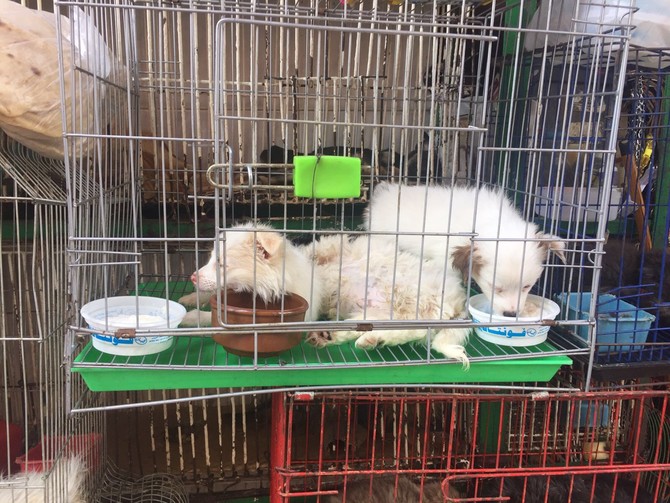CAIRO: A group of animal rights activists have come together to take on the woeful conditions in Egypt’s pet shops, in a country notorious for the ill-treatment of animals.
The campaign started in May, when a social media post about a Husky dog that died outside a Cairo pet shop caught the attention of Arielle El-Bagory.
Soon after, another activist, Leila Gheita called for action after a cat died in similar conditions in a nearby shop.
El-Bagory and Gheita combined forces and started calling on people to join them in approaching pet shops.

“Sixty people showed up and all were interested in taking this further so Leila and I started the group on Facebook,” El-Bagory told Arab News. “Ideally we hope to close down the pet shops that keep animals in horrific conditions, which sadly is most of them.”
Pet Shop Watch Egypt now has more than 1,500 members committed to tackling the inhumane treatment of animals in pet shops. The group organizes regular visits to different shops around the country, with members bringing food and water for the animals, as well as making demands to move animals out of the sun during the hot summer days and improve the conditions of the cages animals are kept in.
While some shops have been cooperative at first, group members complain that these changes are not maintained.
Egypt’s record on animal abuse has been in the spotlight in recent years.
The Gezira Sporting Club, popular among Cairo’s wealthier residents, sparked outrage in 2014 when a security guard caught someone leaving the club with a bag full of dead cats, apparently beaten and poisoned to death in an attempt to control their numbers.
In February the following year, a video of three men brutally torturing and killing a dog in the street went viral.

Until recently, Egypt’s constitution did not contain any laws for the protection or welfare of animals, with the exception of animals used for agriculture. This was extended in 1982 to include domesticated animals like dogs and cats. An amendment in 2014 was introduced for the protection of the environment, including the “prevention of cruelty to animals.”
However, penalties for breaking these laws are still limited to a maximum of six months in prison, and a fine not exceeding 200 Egyptian pounds ($11).
According to a 2014 report by World Animal Protection, Egypt obtained an “F” ranking on the Animal Protection Index, with “G” being the lowest. The report stated that the country’s “existing legislation presents an imprecise framework of protection.”
This, in addition to a lack of serious penalties, means that protection of animals is often inadequate.
There are currently three government bodies in Egypt related to animal welfare, The Ministry of Agriculture and the Egyptian Environmental Affairs Agency, both responsible for legislation, and the General Organization for Veterinary Services.
The latter, in collaboration with local police, has organized the culling of Egypt’s stray animals, with graphic photographs and videos being circulated of them torturing and poisoning large numbers of street dogs and cats.
The organization is also ment to be used by people in Egypt to report the inhumane treatment of animals.
El-Bagory said one of their success stories was when they shared a photo of a Macaw parrot in a sorry state at the Rehab Animal Park in Cairo.
Enough people complained to the Egyptian Environmental Affairs Agency, that the birds were confiscated and transferred to improved conditions at Giza Zoo.
The group is still trying to find the best approach for dealing with non-exotic animals, as the laws do not cover domesticated animals in captivity.
With so few governmental organizations playing an active part in the protection of animals, it is left to groups like Pet Shop Watch Egypt to take the lead.
“We are trying our best to use public pressure, as well as following the legal avenues to report these shops,” El-Bagory said. “One of the things we hope to achieve is to convince buyers to boycott those that sell animals.”
The group has also tried to educate shop owners and employees in an effort to reduce the number of animals suffering. They distribute pamphlets that discuss the proper treatment of animals, as well as excerpts from the Quran that encourage kindness and mercy towards animals.
Poverty and a lack of education are two major factors that play a role in the welfare of animals in Egypt.
Katie McManus, an English teacher and member of Pet Shop Watch Egypt, joined the group knowing that the country faces a significant problem.
“It’s mostly down to lack of education,” McManus said. “If pets are going to be your business, you should be informed about how to properly care for them.”
Abu Bakr, a 38-year-old employee at one of the pet shops visited by members of Pet Shop Watch Egypt, showed his frustration at the way they were approached by the activists, saying he felt the rights of the animals were of more importance than his own.
“They were very aggressive with us, most of them using offensive or irritating language,” Abu Bakr said. “They wouldn’t treat a dog the way they treated us. They come and yell about animal rights, but what about human rights? I am walked all over on a daily basis.”
Abu Bakr’s sentiments are shared by many Egyptians, who see the plight of animals as secondary to their own deeply-rooted and pervasive struggles.
He explained that if he had been approached calmly he would be more willing to listen. “In the end this is a business. Even if I work here because I love animals, the aim is to make a profit. If someone comes and gives me advice on how to do my job better, I’m happy to listen,” he said. “We cleaned up the cages and stopped selling dogs completely because they were difficult to keep clean.
“The only dog we keep is mine,” he said, pointing to a dog lying down on the road outside the shop, “for breeding.”






























